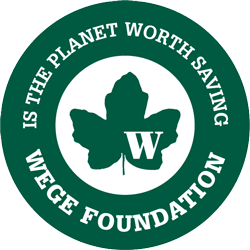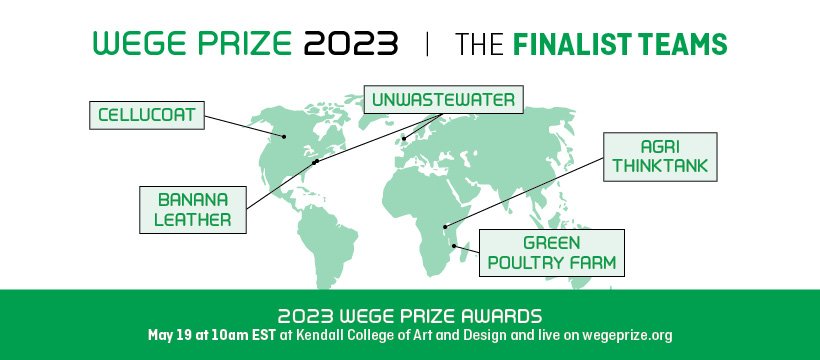The five student teams, from nine countries and 10 academic institutions, debut innovations addressing waste, hunger, climate and injustice as they transform economy.
Grand Rapids, Michigan, USA April 17, 2023 —For a world reeling from hunger, climate impacts, food waste and inequity, five student teams have stepped forward with expert-reviewed and innovative solutions as part of Wege Prize 2023, with several projects focused on advances in agriculture that cut carbon emissions and sustain developing communities.
These groundbreaking ideas are nurtured by Wege Prize, organized by Kendall College of Art and Design’s Wege Center for Sustainable Design with support from the Wege Foundation. The annual competition ignites game-changing solutions for the future by inspiring college/university students around the world to collaborate across institutional, disciplinary, and cultural boundaries to redesign the way economies work. This year saw 60-plus entries from teams hailing from five continents. The five competitors, vying for $65,000 USD in total cash prizes, will present their ideas to a public audience at the annual Wege Prize Awards in Grand Rapids, Michigan, at 10:00am ET on Friday, May 19 at Kendall College of Art and Design (KCAD) and streaming live online at WegePrize.org. The diverse, multidisciplinary teams include:
-
Agri ThinkTank: Hailing from Rwanda, students from three institutions devise a tech solution to boost collection of agricultural waste for community composting.
-
Banana Leather: A way to make plant-based leather from mainly banana crop waste results from teamwork in Yale University’s business and environmental management programs.
-
Cellucoat: Students from four countries at University of Calgary innovate with a biodegradable, antimicrobial replacement for plastic packaging—and pollution.
-
Green Poultry Farm: Addressing environmental impacts of poultry farming, students from Mozambique—in four unique majors—use anaerobic digestion to create usable waste streams.
-
UnwasteWater: From four U.S. and European universities, this team tasks microbes to convert wastewater into raw materials for use in industrial and commercial products, closing the circle between the production and disposal of pharmaceutical chemicals.
BUILDING A BETTER FUTURE
As part of Wege Prize, the teams have turned their ideas, starting as informal proposals, into robust and feasible solutions. With the input of expert judges, the five finalist teams employ research, market analysis, and real-world prototyping and testing to advance their plans.
“These inspired, dedicated students are innovators and disruptors in ways that offer a glimpse of the bright and optimistic future,” adds DeBruyn. “What makes it possible? Collaborate across institutional, disciplinary, and cultural boundaries to redesign the way economies work.”
Established in 2013, Wege Prize encourages student teams to solve complex, layered problems with a diverse, collaborative approach. The competition’s rules and design brief call for developing new, tangible solutions to producing and consuming essential goods — in sustainable ways that can be applied and used after the competition ends.
LIVE EVENT: 2023 WEGE PRIZE AWARDS, FRIDAY MAY 19
This year, the Wege Prize Awards is once again a free, in-person program held at KCAD in Grand Rapids, Mich., with an accompanying free livestream that will be watched globally starting on Friday, May 19 at 10:00am ET. Watch the students defend their ideas and respond to final judge feedback along with a worldwide audience. To attend 2023 Wege Prize Awards: Game-Changing Solutions to Wicked Problems, or to view the livestream, please find event details and registration at wegeprize2023.eventbrite.com.
MORE ABOUT THE FIVE FINAL TEAMS

Based in Rwanda, Agri ThinkTank is using food waste to make eco-friendly compost and livestock feed using black soldier flies (BSF), helping farmers access products that maximize agricultural production, reduce environmental contamination, and improve living standards. Developed products are accessed and sold through an app, which identifies when waste is available to collect and connects users to the resulting compost and feed products.

Team Banana Leather is producing an alternative leather material from banana plants that is vegan, cruelty-free, sustainable and circular. Made from banana crop waste sourced from India, the process not only helps with the country’s agricultural waste issues, but provides an additional source of income for farmers. Unlike other vegan leather alternatives, Banofi (Bannana-fibre leather) aims to become a 100% biobased and biodegradable product.

Team Cellucoat is developing a compostable, biodegradable, and customizable bacterial cellulose-based plastic alternative suitable for food packaging that is also antimicrobial, prolonging produce shelf life. Cellucoat also utilizes fruit waste from grocery stores and consumer homes for their bacterial cellulose growth media, helping to mitigate produce waste issues.

Team Green Poultry Farm addresses the wicked problem of environmental pollution associated with poultry farming in Mozambique, with an innovative biodigester system that converts poultry waste into biogas and biofertilizers, through anaerobic digestion. The biogas is converted into electricity and heat to meet energy needs within poultry production and the biofertilizer is used to grow feed for the poultry, promoting maximum use of resources and contributing to the circular economy by keeping materials in the loop.

Team UnWastewater seeks to eliminate waste in the form of wastewater, circularize the pharmaceutical industry and regenerate the natural environment via carbon capture by closing the circle between the production and disposal of pharmaceutical chemicals through microbial electrosynthesis (MES). By utilizing MES, a novel method of biochemical carbon capture and utilization to synthesize chemical products, UnWasteWater aims to valorize domestic wastewater for use in organic chemical feedstocks, and ultimately protect the environment, improve human health, and regenerate nature.

